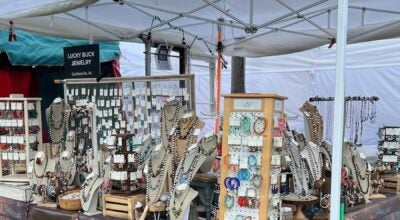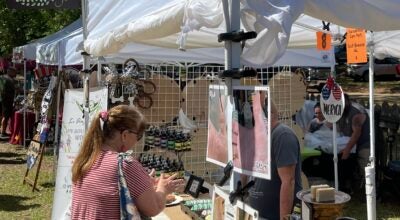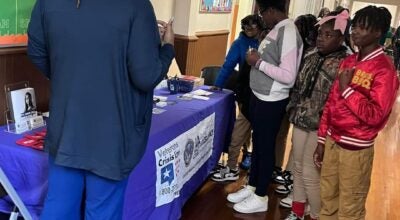Officials, experts meet in White Hall to address county’s wastewater treatment problems
Published 10:57 am Wednesday, November 23, 2011
By Fred Guarino
The Lowndes Signal
“We have some people that are not on the water system. They don’t have septic tanks at all.”
Those were the words of house-to-house surveyor Ruby Rudolph concerning the wastewater treatment issues of Lowndes County addressed at a Wastewater Summit held at the Army Corps of Engineers building in White Hall last Friday.
Decentralized wastewater treatment systems versus conventional systems, composting toilets and alternative methods of disposing of waste and treating wastewater were among some of the topics discussed at the summit sponsored by the Alabama Center for Rural Enterprise (ACRE) and the Equal Justice Institute.
Officials and experts from around the country attended the event to discuss the Lowndes County house-to-house survey results, soil conditions and possible solutions (technologies) toward developing a master plan to solve the wastewater treatment problems of the county.
According to Catherine Coleman Flowers, executive director of ACRE, the state Health Department has estimated that as much as 80 percent of Lowndes County does not have functioning septic systems.
However, she said, the issue is not just raw sewage, but septic tanks more than 15 years of age that are not compliant with current regulations.
On hand last Friday were house-to-house surveyors Mary McDonald, Ruby Rudolph and Geraldine Gamble.
According to Flowers, they were among five surveyors from County Commission districts hired with funds from an EPA grant that also included Antory Poole and Steven Thigpen.
She said the survey would identify where the people of Lowndes County live. With United States Department of Agriculture soil survey data on the county, the needs for raw sewage treatment could be planned.
She also said a governance committee would be formed including the county and municipalities of the county.
McDonald said she saw a pond in a yard that she thought was just standing rainwater. But she said the owner said it was “raw sewage.”
She said another woman told her, “I smell raw sewage in my house when nothing is going on.”
She said the woman told her when she turns on water in the kitchen sink, the water backs up in the bathtub. She also told her a neighbor had raw sewage backup in the tub.
“Some people don’t have any problems and some people have just major problems,” said McDonald.
“We have some people that are not on the water system. They don’t have septic tanks at all,” Rudolph said.
She thanked the experts and other officials for coming “to see what we can do or whatever you can do to help us to get these problems corrected. Our people need help.”
Gamble said one woman told her that when it rains, she has raw sewage. She said the lady told her rain does not soak into the soil. And she said the woman told her the whole community could not go outside because of the condition.
“I cry at night about my people, and I thank you all so much for coming down here,” said Gamble.
Flowers said in addition to the United States Department of Agriculture, her group is looking at private funding from foundations as a possible resource to help solve the wastewater treatment problem because they are putting money into other parts of the world.
“So, if they can build treatment facilities and so forth in other places, they need to look at places in the Black Belt,” she said.
Flowers also spoke of an education outreach to educate the community.
“A lot of people make choices (for wastewater treatment) because they don’t have the correct information,” she said.
She said there will be public service announcements and a website.
Flowers asked all those who attended for ideas and suggestions. She said a paper will be put together “that will explore what we talked about today and also what we need to do in the future in terms of the next step.”
“Ultimately, we are not just going to keep having meetings and talking about problems, we’ve got to start talking about solutions, how we are going to implement them,” Flowers said.
She also suggested that volunteer homes might be used a sites to test possible wastewater systems.
While Flowers said there will be a series of other activities similar to the summit. She said the next step is seeing how various treatment systems work. She also called for engineers to design toilet systems that can be used in mobile homes.
“This is going to be a community effort,” she said.
Among experts and officials on hand Friday were Lawrence McGhee, Natural Resource Conservation Service; Burton Fisher, environmentalist with the state Department of Public Health; Dr. Bob Rubin, professor emeritus, North Carolina State University; Jerry Stonebridge, owner of Stonebridge Environmental, Freeland Wash.; Earle Barnhart and Hilda Maingay, community activists of Cape Cod, Mass.; and Carol Steinfeld, author of “Liquid Gold,” an ecological solutions advocate.
Among local officials included Council members Dennis Blair and David Spooner of Lowndesboro and Lowndes County Commission Chairman Charlie King Jr.
McGhee spoke of the high clay content of the soil in some places.
“And the soil conditions around here are very extremely high in clay content so the effluent is not going back into the soil. So, your systems are not functioning property,” he said.
Fisher said some septic tanks fail for lack of maintenance, a high water table, more than one household connected to a septic system.
Ruben spoke of decentralized wastewater treatment systems including storm water systems.
“No matter what you do, it has to be managed,” he said.
He also said the traditional approach is to collect all the water, treatment and dispose of it in a river somewhere.
Ruben said in a decentralized approached the service area is smaller with less impact on a receiving stream.
“You can’t afford, environmentally and physically you can’t afford to sewer the area and run all of the water in the Alabama River,” he said.
Barnhart, Maingay and Steinfeld all spoke of alternative treatment systems such as composting toilets in which a person would have an individual system to turn waste into a harmless compost.
Marty Clark of Water Resource Management LLC pointed out that septic system installers are required to have a license. He said a lot of the problems are the result of non-licensed installers who didn’t do quality work.





